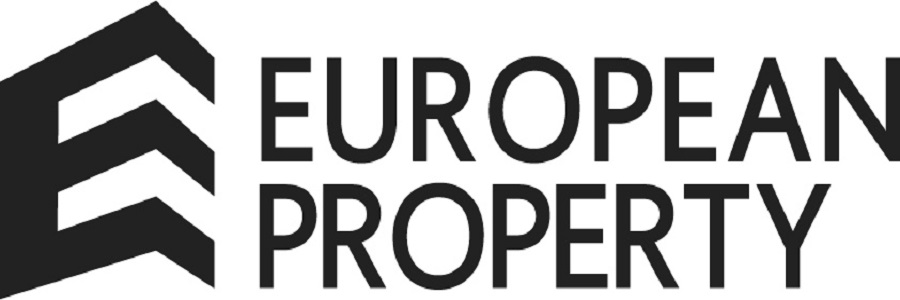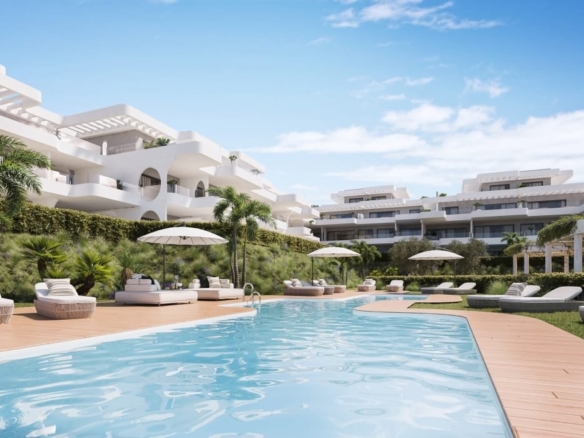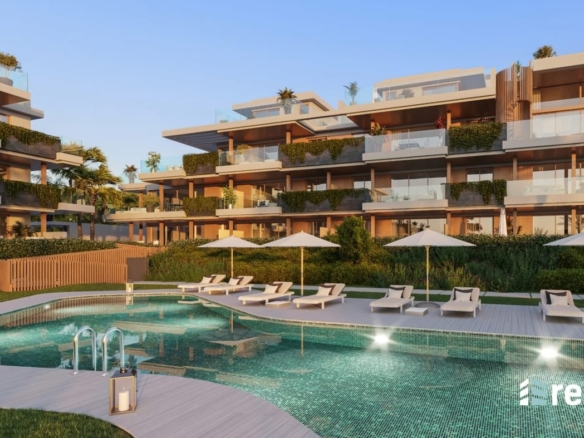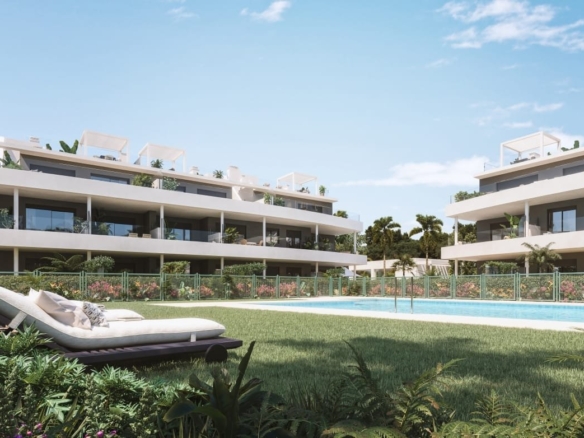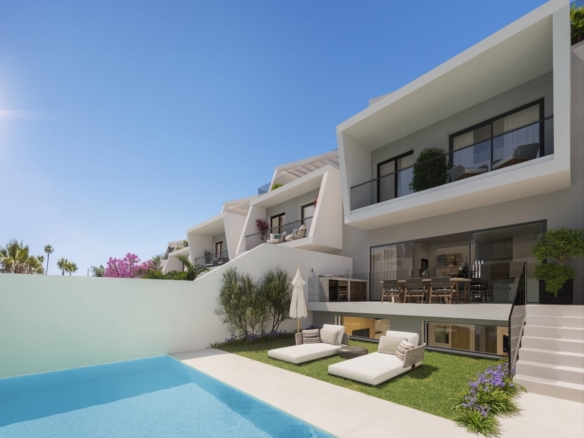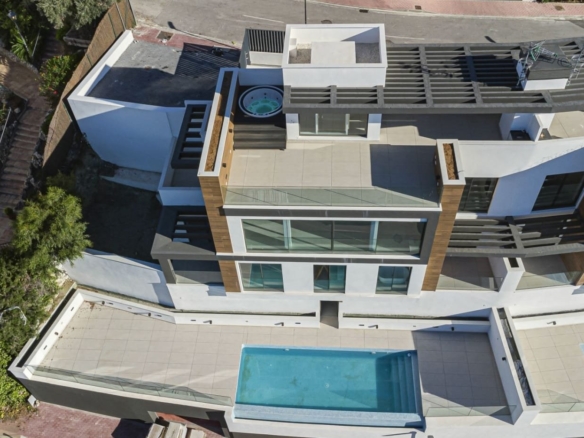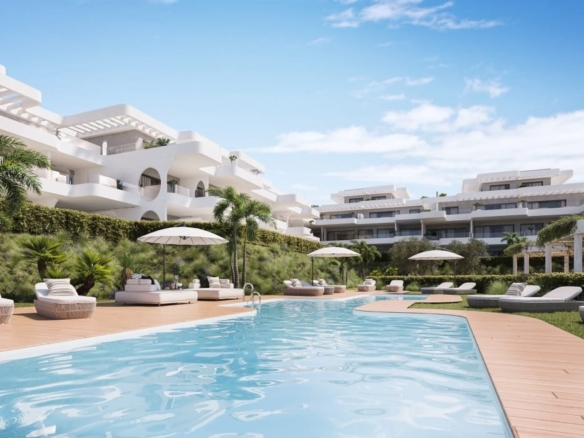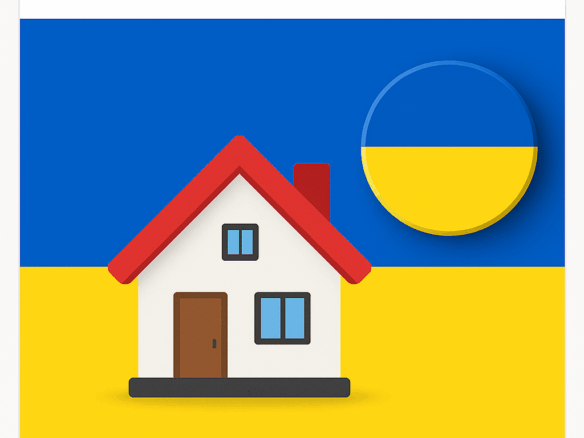Buying property in Southern Spain isn’t just a transaction; it’s a strategic investment into a lifestyle defined by sun-drenched coastlines, world-class golf courses, and a remarkably stable real estate market. It’s a move that blends astute financial planning with the pursuit of an unparalleled quality of life, which is why it continues to attract a discerning global audience year after year. For high-net-worth buyers, the journey is refreshingly straightforward when guided by the right expertise.
Why Southern Spain’s Property Market Commands Lasting Appeal
Southern Spain, and Andalucía in particular, offers so much more than its famous beaches and 300+ days of sunshine. For seasoned investors and those seeking a luxury lifestyle, its real value lies in the sophisticated infrastructure that underpins the entire property market. This is a region built for an international audience, and its resilience stems directly from that long-term vision.
It’s a global hub for leisure and luxury. You have some of Europe’s finest golf courses, exclusive private marinas like Puerto Banús, luxury homes in Marbella and a culinary scene that ranges from Michelin-starred restaurants to authentic beachfront chiringuitos. This well-established ecosystem creates a consistent draw for high-net-worth individuals, which in turn keeps the demand for premium property incredibly robust.
A Stable and Mature Market
Unlike more volatile emerging markets, Southern Spain’s property sector is mature and well-regulated. It has weathered economic cycles before, proving its ability to deliver long-term capital appreciation. When you combine that desirable lifestyle with solid investment fundamentals, you have a powerful proposition for buying property in Southern Spain.
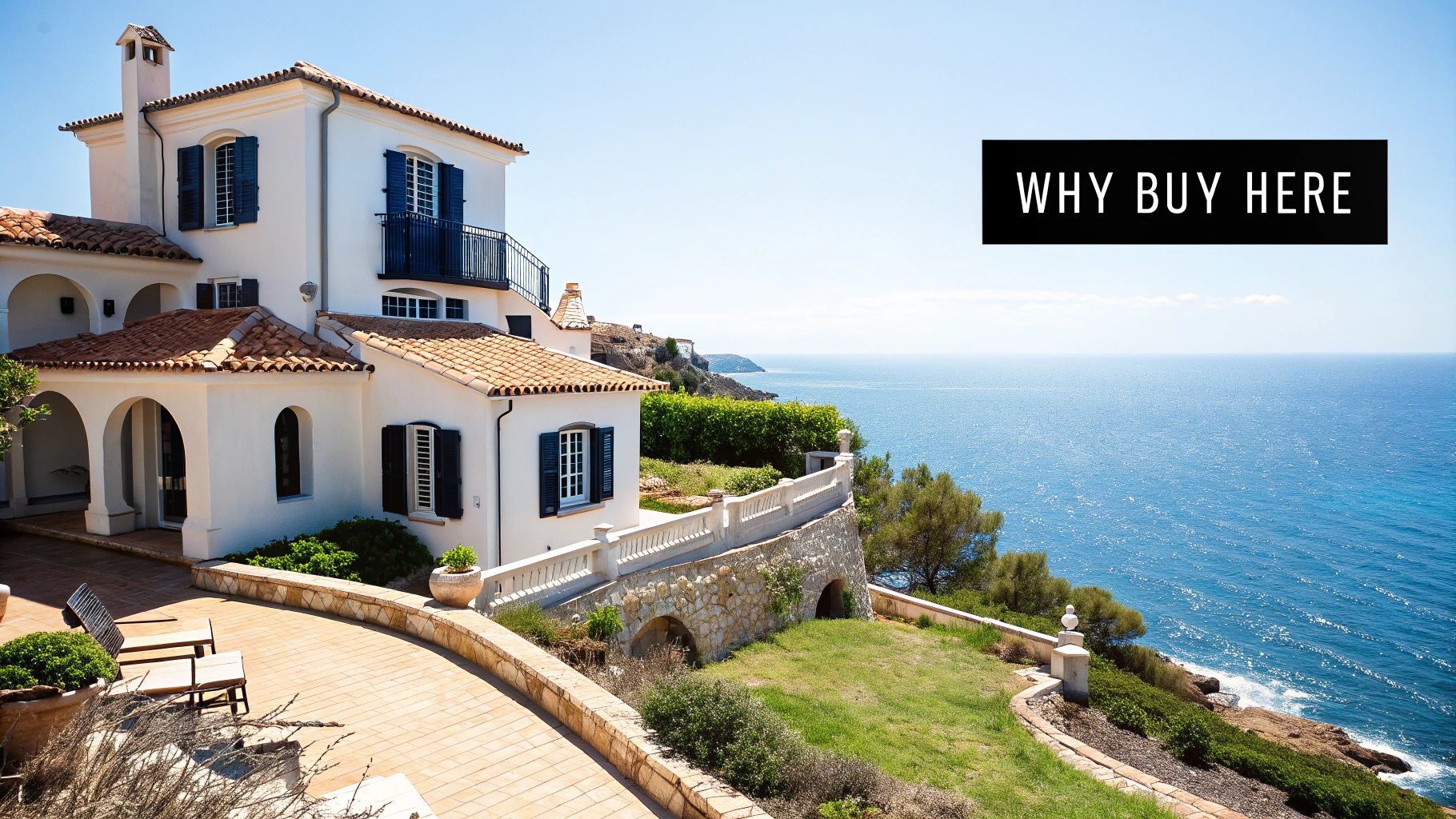
The market’s stability is also bolstered by its diverse international buyer pool. While historically a favourite for Northern Europeans, the region now attracts investors from the Middle East, North America, and beyond. This global interest means the market isn’t overly dependent on any single economy.
British buyers, for instance, continue to be a major force. In the first quarter of this year alone, they were behind 2,110 property purchases out of 21,525 foreign transactions. That solidifies their spot as the leading nationality of overseas buyers, even with recent economic shifts. You can dig into more data on foreign demand for Spanish property to understand these market dynamics.
Your Journey to Ownership
Successfully buying property in Southern Spain comes down to strategic execution. The process itself is transparent but requires careful navigation of legal and financial steps. This guide provides a complete roadmap covering every critical stage:
- Pinpointing the Right Location: From the glamour of Marbella to the quiet prestige of Sotogrande.
- Legal Framework: Understanding the essential roles of the abogado (lawyer) and notario (notary).
- Financials and Taxation: A clear breakdown of purchase costs, taxes, and different financing routes.
- Due Diligence: The non-negotiable checks that protect your high-value asset.
This structured approach is designed to give you the clarity and confidence required to secure your investment in one of Europe’s most desirable property markets.
Finding Your Niche in Andalucía’s Prime Locations
Choosing the right location when buying property in Southern Spain isn’t just about selecting a postcode; it’s a strategic decision. You must align an area’s unique character, lifestyle, and investment profile with your own personal and financial ambitions.
The secret to a successful purchase is understanding the distinct micro-markets dotted along the Andalusian coastline. Each one offers a completely different proposition for the best places to buy luxury property in Andalusia.
The magnetic pull of this region is impossible to ignore, and the numbers confirm it. Foreign buyers are a major force, snapping up 38.4% of all properties sold in the province of Málaga—nearly triple the national average.
This demand is incredibly focused. A staggering 67.5% of all foreign buyers in Andalucía choose Málaga province, a testament to the powerful draw of its Mediterranean lifestyle. While the region is vast, the prime investment corridors are very well-defined.
To help you navigate these hotspots, here’s a closer look at what each prime location truly offers the discerning buyer.
Comparative Analysis of Prime Andalusian Locations
The table below breaks down the key luxury property hotspots in Southern Spain, comparing their distinct lifestyle offerings, typical property types, and the investor they attract. It’s a snapshot to help you pinpoint where your investment ambitions align.
| Location | Primary Appeal | Predominant Property Style | Ideal Investor Profile |
|---|---|---|---|
| Marbella Golden Mile | High-octane glamour, social scene, brand prestige | Grand villas, exclusive penthouses in gated communities | Those seeking high liquidity, strong rental yields, and a globally recognised address. |
| Sotogrande | Understated elegance, privacy, family-centric, elite sports | Sprawling private estates, large villas with extensive grounds | Discerning families and individuals prioritising privacy, security, and a quiet, high-quality lifestyle. |
| Benahavís | Panoramic views, modern architecture, ultimate seclusion | Contemporary villas, state-of-the-art apartments | Buyers looking for cutting-edge design and the prestige of Europe’s most exclusive residential estates. |
Each of these enclaves delivers a world-class experience, but the type of experience is fundamentally different. Your choice will define your life in Southern Spain.
The Glamour of Marbella’s Golden Mile
Marbella needs no introduction. Its legendary Golden Mile is the undisputed epicentre of luxury, a world of high-end boutiques, exclusive beach clubs, and a social calendar that never sleeps. This is where you invest if you desire to be at the heart of the action.
Here, prime real estate commands premium prices and delivers strong rental yields, fuelled by insatiable global demand. Properties are typically grand villas on large plots or stunning penthouses in coveted communities like Sierra Blanca. The market is liquid, resilient, and consistently attracts ultra-high-net-worth individuals who value brand prestige and social connectivity.
“The key is understanding the micro-markets; each coastal town offers a distinct lifestyle and investment return. Marbella offers glamour, while Sotogrande provides understated exclusivity. Your choice defines your entire experience in Southern Spain.”
— Nick Marr, Founder of EuropeanProperty.com
The Understated Elegance of Sotogrande
Just a short drive west, Sotogrande offers a completely different flavour of luxury. It’s renowned for its world-class polo fields, a prestigious international school, and sprawling private estates that exude quiet sophistication.
This isn’t about overt glamour; it’s about privacy, space, and an elite sporting lifestyle. The property landscape is dominated by large, private villas with extensive grounds, often wrapped around championship golf courses like Valderrama. Sotogrande is the preferred choice for discerning buyers who value a secure, family-oriented community over the high-energy buzz of Marbella.
The Panoramic Retreat of Benahavís
Tucked away in the hills between Marbella and Estepona, Benahavís has carved out a niche as a haven for modern architectural marvels. This municipality is famous for its ultra-exclusive gated communities like La Zagaleta, which offer unparalleled privacy, security, and jaw-dropping panoramic views of the Mediterranean.
Often called the “dining room of the Costa del Sol” for its incredible culinary scene, Benahavís perfectly blends rural tranquillity with easy access to coastal amenities. The real estate here is defined by contemporary villas and state-of-the-art apartments designed for seamless indoor-outdoor living. It attracts investors who crave cutting-edge design and the seclusion of Europe’s most exclusive estates. For a wider view of top-tier Spanish locations, our guide on the best places to buy property in Spain is an excellent starting point.
Ultimately, choosing between these premier locations depends on your vision. Are you seeking a high-yield rental powerhouse in a social hub, a private family sanctuary, or an architectural statement piece? Your answer will lead you to the corner of Andalucía that is truly right for you.
Mastering the Spanish Property Acquisition Process
The Spanish property buying process is remarkably clear-cut, particularly compared to procedures in other countries. For international investors focused on buying property in Southern Spain, understanding these key milestones is the secret to a smooth and secure transaction. This section demystifies the legal framework, ensuring you proceed with confidence at every stage.
First, any non-resident needs a Número de Identificación de Extranjero (NIE). This is your unique tax identification number in Spain and is non-negotiable for buying property, opening a bank account, or handling tax obligations. Our advice is to apply at a Spanish consulate in your home country before starting your search, or make it your first priority upon arrival in Spain. Processing times can be unpredictable.
Simultaneously, open a Spanish bank account. It is a practical necessity for transferring funds for your deposit and final payment, and will be essential later for utility bills and other running costs.
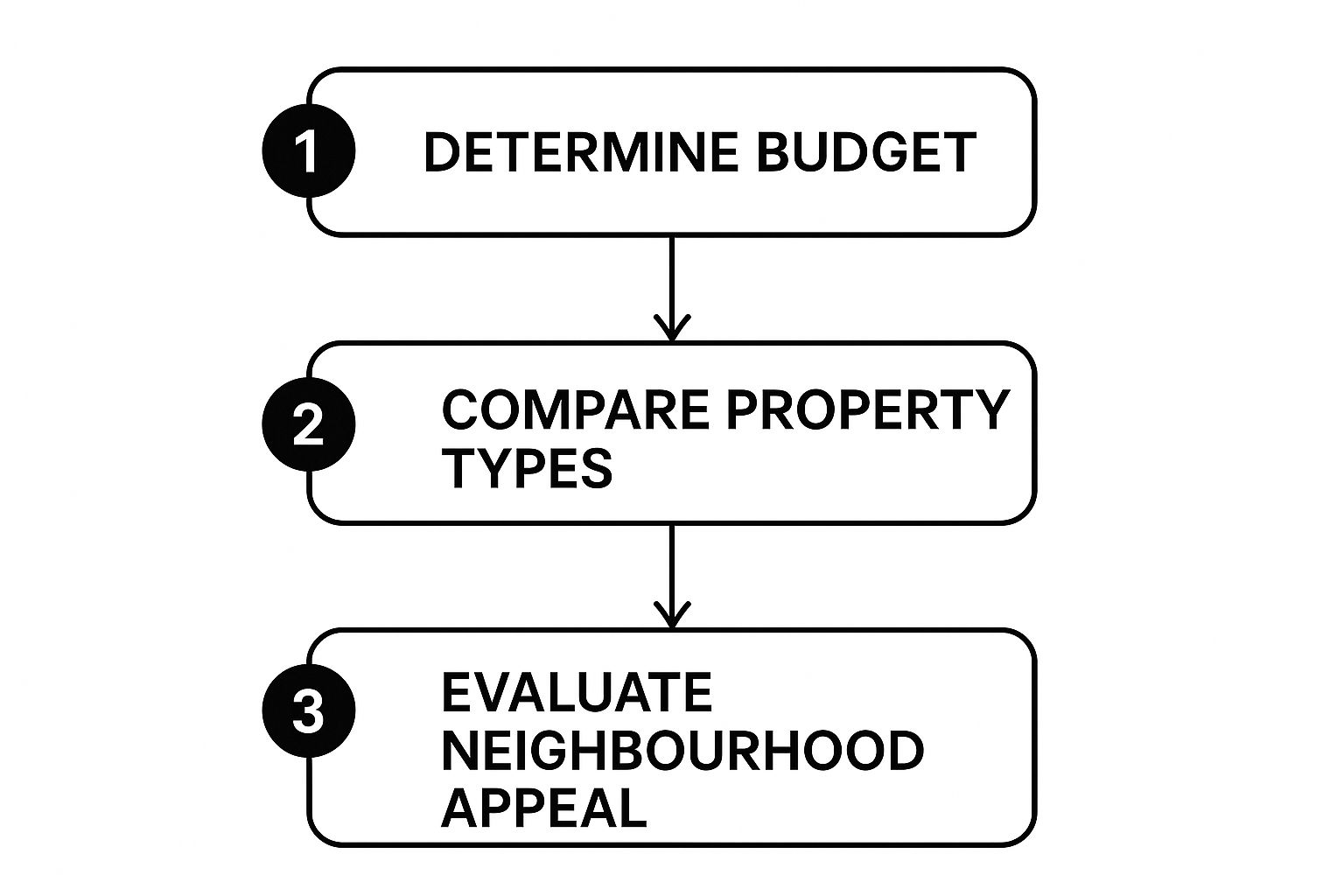
As this illustrates, defining your budget, property type, and ideal location is fundamental. It focuses your search and strengthens your negotiating position.
The Key Players: Your Abogado and Notario
In Spain, you will work with two key legal figures: the abogado and the notario. Their roles are distinct, and both are vital for your protection. Confusing them is a common mistake for foreign buyers.
Your abogado (lawyer) is your advocate. They represent your interests exclusively. Their role is to conduct all essential due diligence, review contracts, and ensure the property is free of debts or legal encumbrances. A reputable, independent lawyer is your most valuable ally.
The notario (notary), conversely, is a public official who acts as an impartial witness to the sale. They verify the identities of all parties, confirm the transaction is legally sound, and officially witness the signing of the final deed. A notario does not perform due diligence on your behalf; their role is to formalise the agreement.
Dissecting the Critical Legal Documents
The path to ownership is marked by three crucial documents. Understanding their function provides the clarity needed to navigate the purchase process.
- The Property Registry Report (‘Nota Simple Informativa’)
This is the first document your lawyer will obtain. The Nota Simple provides a snapshot of the property’s legal status. It confirms the registered owner, provides the official description (size, boundaries), and—most importantly—reveals any outstanding debts, mortgages, or liens (cargas) attached to the property. This check is an absolute deal-breaker because in Spain, debts are tied to the property, not the owner. - The Private Purchase Contract (‘Contrato de Arras’)
Once all checks are complete and satisfactory, you will sign a private purchase contract with the seller. This legally binding agreement outlines all terms: the price, payment dates, and a completion deadline. Upon signing, you will typically pay a deposit of 10% of the purchase price.This contract almost always includes an arras penitenciales clause. This powerful condition states that if you, the buyer, withdraw, you forfeit your deposit. However, if the seller withdraws, they must repay you double your deposit.
- The Final Title Deed (‘Escritura de Compraventa’)
This is the final stage, signed in the notario’s office. The Escritura is the document that officially transfers ownership to you. On signing day, you will pay the remaining balance of the purchase price, and the seller will hand over the keys. The notario then sends the details to the Spanish Land Registry, cementing you as the legal owner.
Navigating these steps with a skilled legal team is the best way to ensure your investment is secure. For a deeper dive into the specific requirements for overseas buyers, our comprehensive guide on buying property in Spain as a foreigner has a wealth of extra detail. With this structured approach, the process becomes a clear and manageable path to owning your slice of Southern Spain.
Navigating Taxes and Financing Your Purchase
Gaining a firm grip on the complete financial picture is critical for a successful property investment in Southern Spain. The list price is merely the starting point. We advise clients to prudently budget for an additional 10-15% on top to cover all associated taxes and fees.
This is not just about avoiding unpleasant surprises; it is about astute financial planning. Getting this right from the outset ensures the entire process runs smoothly. Whether you are considering a sleek, modern villa in Benahavís or a frontline beach apartment in Marbella, these underlying costs are a fundamental part of your investment analysis. Let’s break down exactly what you will be paying for.
Understanding Property Purchase Taxes
The main tax you will face depends on whether you are buying a brand-new home or a resale. The answer places you on a different tax path.
If you are buying a resale property from a private owner, you will pay Property Transfer Tax (ITP). In Andalucía, the ITP rate is a straightforward, flat 7%, a welcome simplification from the old, tiered system. This is paid by you, the buyer, upon completion.
Conversely, if you are buying a new-build property directly from a developer, you will pay Value Added Tax (IVA) at 10%. You will also have to pay Stamp Duty (AJD – Actos Jurídicos Documentados), which is 1.2% in Andalucía.
Other Essential Purchase Costs
Beyond these significant taxes, several other mandatory fees will contribute to your total outlay. While small individually, they add up and must be factored into your budget.
- Notary Fees: You’ll pay these for the official witnessing and registration of the Escritura (Title Deed). The fees are on a fixed scale based on the property’s value but usually fall between 0.5% and 1%.
- Land Registry Fees: This is for officially registering your ownership at the Land Registry (Registro de la Propiedad). It’s also based on a sliding scale and typically costs slightly less than the notary fees.
- Legal Fees: Hiring a good, independent lawyer (abogado) is non-negotiable. Their job is to perform all due diligence and manage the transaction. Expect to pay around 1% of the purchase price, plus IVA.
For a detailed checklist of these expenses, our guide on the hidden costs when buying a property in Spain provides an invaluable breakdown to help you budget with precision.
Financing Strategies for International Buyers
High-net-worth buyers often have several sophisticated financing options. Many simply leverage existing relationships with international private banks, which can offer bespoke lending and simplify the transfer of funds. To minimise costs when moving large sums for your purchase, it is worth researching the cheapest ways to send money internationally.
Another well-trodden path is securing a mortgage from a Spanish lender as a non-resident. Spanish banks are very familiar with international clients and will typically lend up to 60-70% of the property’s valuation price. The application process is thorough, so be prepared to provide extensive documentation, including proof of income, tax returns from your home country, and a credit report. This is a key part of the mortgage process for non-residents in Spain.
Keeping an Eye on Legislative Changes
The rules for foreign property ownership can and do change, so staying informed is vital. For example, UK buyers are currently facing some uncertainty after Spain’s Sumar electoral alliance proposed a 100% tax on property purchases by non-EU residents.
This measure, aimed at cooling the market for locals, would essentially double the cost for British nationals and could seriously shake up their position as the largest group of foreign buyers. While not yet law, it highlights the importance of obtaining up-to-the-minute legal and financial advice. This ensures your strategy for buying property in Southern Spain is built on solid ground, protecting your asset from any future surprises.
Conducting Robust Due Diligence Before You Close
In the world of luxury property, proper due diligence is your most powerful form of protection. When buying property in Southern Spain, this process is far more than ticking boxes. It’s a sophisticated deep dive to safeguard a high-value asset, and rushing it is a false economy that can prove costly.
Your independent lawyer (abogado) is the key to this entire stage. Their sole responsibility is to conduct a meticulous investigation into every legal aspect of the property. They must ensure the asset you are about to acquire is clean, compliant, and free from any unwelcome surprises. For an investment of this scale, a cursory check is insufficient.
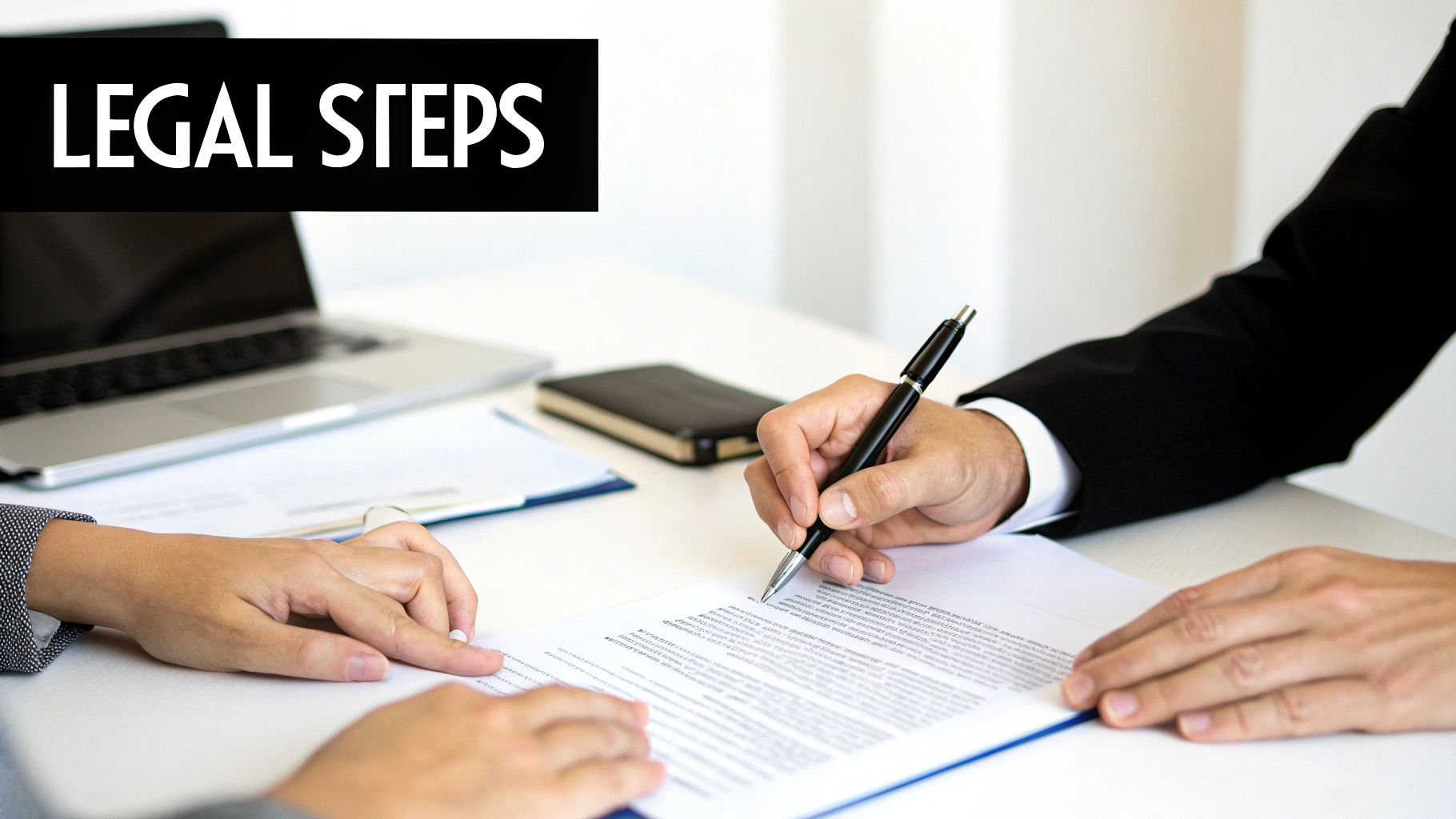
Verifying Planning Permissions and Legal Status
First, your legal team must confirm the property’s complete legality. This involves examining the original building licences to ensure everything was built as permitted. It is surprisingly common to find that previous owners have made extensions or alterations—like adding a guest house or extending a terrace—without obtaining the required planning consent.
Any unrecorded work can create major complications, potentially leading to hefty fines or, in the worst-case scenario, demolition orders. A good lawyer will cross-reference the property’s description in the Land Registry (Registro de la Propiedad) with the Catastral record (the tax office’s register) to flag any discrepancies immediately.
Checking for Debts and Encumbrances
This is a critical step. Your lawyer must check for any outstanding debts, known as cargas, attached to the property. In Spain, debts are tied to the asset, not the owner, which means they transfer to you, the new buyer, upon completion.
This is a crucial point many international buyers overlook. Unpaid mortgages, property taxes (IBI), or community fees can become your responsibility. A comprehensive check of the Nota Simple will reveal any registered liens or mortgages against the title.
Your lawyer should also obtain a certificate from the community of owners (comunidad de propietarios) confirming that all service charges are paid up to date. This simple document prevents you from inheriting the previous owner’s arrears.
Complying with Spain’s Coastal Law
If you’re buying a frontline beach or coastal property, an extra layer of diligence is non-negotiable. The Spanish Coastal Law (Ley de Costas) imposes incredibly strict regulations on properties within a certain distance of the shoreline, affecting everything from building rights to usage.
A property might have been built entirely legally decades ago but could now fall within a protected zone. Your lawyer must verify the property’s full compliance to ensure there are no restrictions on future renovations or, in rare cases, risks to your long-term ownership. This is a highly specialised area that demands a true legal expert.
The Non-Negotiable Structural Survey
While not legally mandatory, a professional structural survey is an essential part of due diligence, especially for historic properties, rural fincas, or large estates. Engage a Spanish architect (arquitecto) or a chartered surveyor to produce an in-depth report on the building’s integrity.
This survey will flag potential deal-breakers such as:
- Structural defects or subsidence.
- Problems with damp or poor insulation.
- The condition of the electrical and plumbing systems.
- The state of the roof, swimming pool, and any retaining walls.
Armed with this report, you can proceed with confidence, renegotiate the price to cover any necessary repairs, or—most importantly—walk away from a potentially disastrous investment.
Finalising the Purchase at the Notary
The final act of the buying process is the signing of the deed of sale (Escritura de Compraventa) before a public notary (notario). On completion day, you (or your legal representative holding Power of Attorney) will meet the seller and the notary.
The notary’s role is to act as an impartial state official, verifying everyone’s identity, confirming the final payment has been made, and witnessing the signing. Once the Escritura is signed, the keys are handed over, and the property is officially yours. Your lawyer then handles the final steps: paying the relevant taxes, registering your new title deed at the Land Registry, and transferring all utility contracts into your name. This thorough process ensures your investment in Southern Spain is secure from day one.
Your Top Questions About Buying Property in Spain
Even the most experienced international investors have questions when entering a new market. Getting clear answers to these common queries is key to moving forward with confidence when you’re buying property in Southern Spain.
Let’s break down some of the most frequent questions we hear from clients.
What Is the Spanish Golden Visa and Do I Qualify?
The Spanish ‘Golden Visa’ is a residency-by-investment scheme designed for non-EU nationals. It is a popular route to living in Spain, and the most common way to qualify is by purchasing real estate worth at least €500,000, completely free of any mortgage.
This visa is highly sought after because it grants residency not just to you, but also to your immediate family. It also provides visa-free travel across the entire Schengen Area. Navigating the application is a legal process, and it’s vital to ensure it’s perfectly timed with your property acquisition.
What Are the Typical Annual Running Costs?
A good rule of thumb for annual running costs on a property in Southern Spain is between 1% and 2% of its purchase price. This provides a solid baseline for financial planning and covers all essential ongoing expenses.
These costs generally break down into a few key areas:
- IBI (Impuesto sobre Bienes Inmuebles): This is the main annual council tax.
- Community Fees (Comunidad): If you are in a development, these fees cover the upkeep of shared facilities like pools, gardens, and security.
- Non-Resident Income Tax (IRNR): A tax calculated on the property’s potential rental income, which applies even if you do not let it out.
- Maintenance: For a luxury villa with a private pool, large gardens, or smart home systems, you’ll want to budget separately for professional upkeep.
How Long Does the Property Buying Process Take?
For a straightforward purchase in Spain, you should expect the process to take between two and three months. This timeframe starts from the moment your offer is accepted and ends with you signing the final deeds at the notary’s office.
This period allows your lawyer sufficient time to conduct thorough due diligence, enables you to finalise financing, and ensures all parties can coordinate for the final signing of the Escritura de Compraventa. Of course, a more complex purchase, like an off-plan property bought directly from a developer, will naturally take longer.
Is It Better to Buy Property Through a Company?
Some investors consider buying their Spanish property through a corporate structure, such as a Spanish SL (Sociedad Limitada) or even an overseas-held company. This strategy can sometimes offer benefits, particularly around liability protection or for long-term inheritance planning.
However, this is not a simple solution. The tax implications are complex and can change with new legislation, so it is not a one-size-fits-all approach.
Crucial Insight: The decision to buy as an individual versus through a company demands specialist legal and tax advice. It must be tailored to your specific financial situation and long-term objectives. The potential benefits must be carefully weighed against the added complexity and costs. Do not take this decision lightly.
Ready to find your perfect property in Southern Spain? Explore exclusive listings from trusted agents on EuropeanProperty.com.
👉 Start your search for luxury Spanish real estate today
About EuropeanProperty.com
EuropeanProperty.com is Europe’s longest-running luxury real estate platform, online since 1999. It connects luxury real estate agents, developers, and homeowners with high-net-worth buyers and international investors.
Looking for expert mortgage guidance? Get luxury property mortgage advice here:
👉 https://europeanproperty.com/luxury-overseas-mortgages/
Explore more overseas homes for sale at our global partner site:
👉 https://homesgofast.com/overseas-property/

